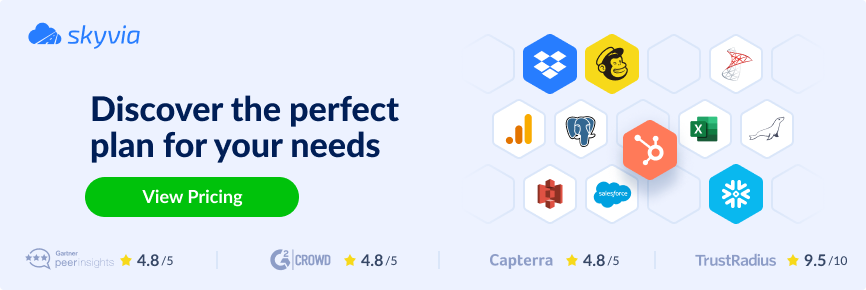ETL (Extract-Transform-Load) is a well-known approach to loading data that originated in the 1970s. It involves a three-step process: extract, transform, and load. The data extraction step consists of getting data from different sources. Data transformation includes data cleansing, filtering, modifying, etc. Finally, the data loading process directs the data to a destination.
There are a number of ETL tools on the market that allow businesses quickly load their data to a central data warehouse and have the entire image of their customers in one place. Google BigQuery is often selected as such central data warehouse because it can store huge volumes of data and process them quickly for data analysis and reporting, providing business owners and managers with a detailed picture. This article discusses some of the most popular ETL Tools for BigQuery.
Table of Contents:
Skyvia
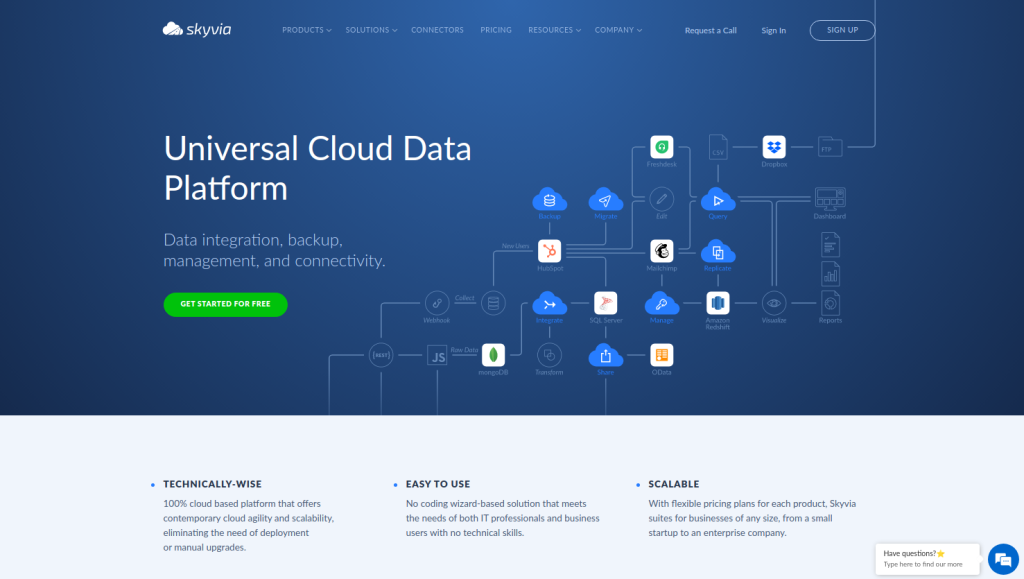
Skyvia is a powerful data platform for solving different data-related tasks. It offers a number of tools for different use cases, including several ETL and ELT tools. It supports a number of different cloud applications and databases and does not require any coding.
The included ETL tools range from simple wizard-based Import for simpler use cases to powerful data pipeline designers like Data Flow and Control Flow, which allow loading data between multiple data sources and building complex multistage transformations, as well as adding custom logic to your ETL operations. Skyvia can both perform ETL to BigQuery and reverse ETL from Google BigQuery to other data sources.
Pros
• Over 180+ supported connectors and new ones are regularly added.
• Easy-to-use, no coding required.
• Multiple tools for different scenarios
• Support for ETL, ELT, and Reverse ETL scenarios
• Detailed error logs in case of errors
• Email notifications
Cons
• Batch ETL support only
• Features are limited in the Free plan
Pricing
Skyvia has several different pricing plan tiers which differ in features available. You can also select the planned volume of data loaded for non-free pricing plans. There is a free plan available, but it includes limited ETL features and only some of the available ETL tools.
The pricing plan doesn’t depend on the number of users or connectors used or the number of created integration – these numbers are unlimited in any plan.
Skyvia also provides a two-week trial period for better pricing plans. You can try all the ETL features within the trial period.
Hevo Data
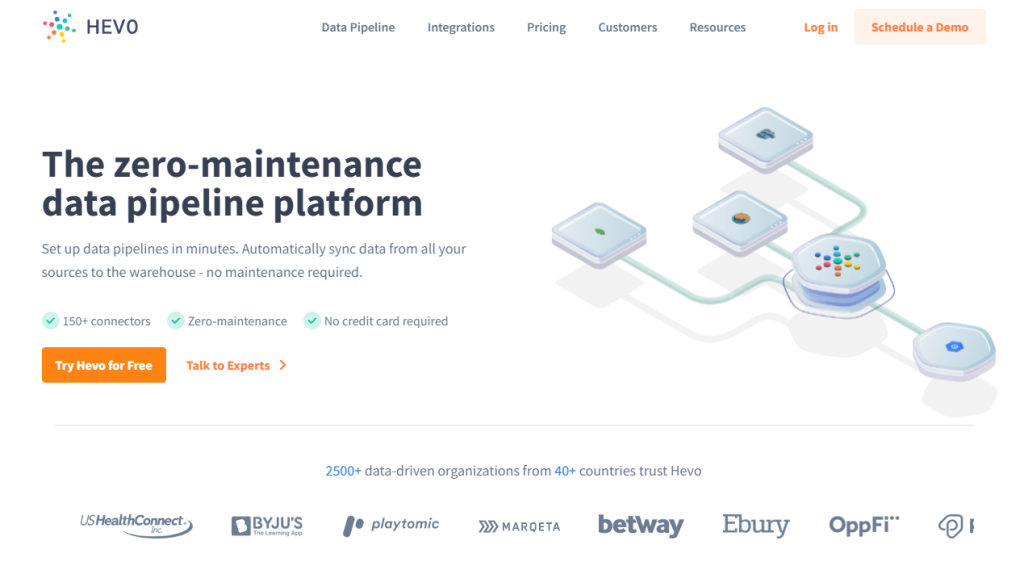
Hevo Data is an end-to-end data pipeline platform that allows the quick loading of data from different data sources to a data warehouse. Hevo positions itself as an ELT tool, but it also includes transformation features. It includes both visually configurable transformation blocks and Python code-based transformations.
Pros
• Over 150 supported connectors
• Easy-to-use UI forms with schema mapper
• Near-real-time data loading to some destinations, ability to schedule data loading to others
• 24/7 live technical support
• Supports reverse ETL from BigQuery
Cons
• Requires Python knowledge for advanced data transformations
• Personal addresses, such as Gmail or Outlook, are not allowed
• Only 50+ free connectors
• Data from BigQuery can only be loaded to cloud data warehouses and relational databases.
Pricing
Hevo Data pricing plans differ in support options and the number of events (new or modified records). There are only 3 pricing plans: the Free plan with 50 free connectors, 1000000 events, and email support; the Starter plan with up to 100 mln events, all the supported connectors, and 24×7 live chat support added; and the Custom plan if you have even higher needs.
Integrate.io
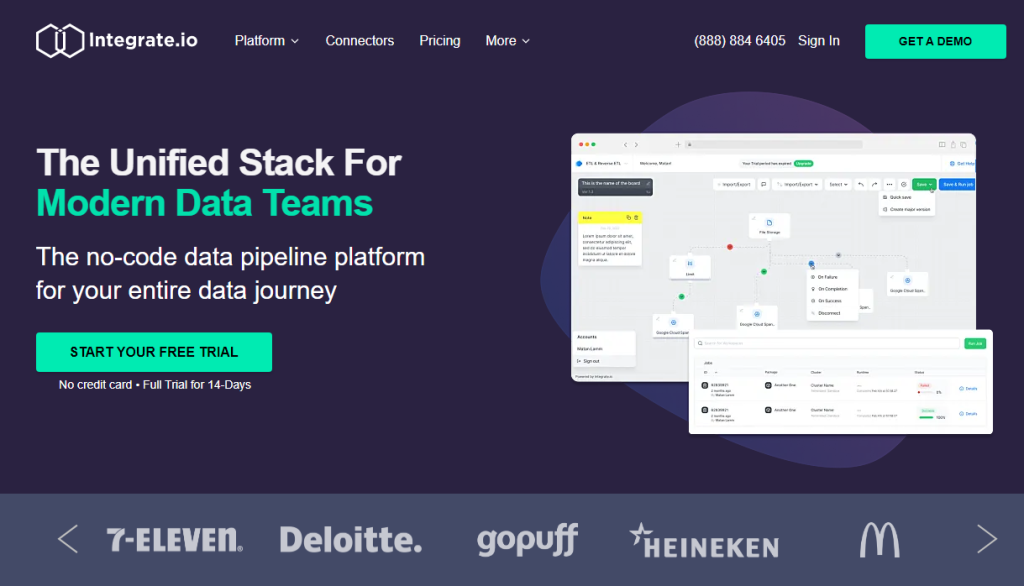
Integrate.io is a no-code data pipeline platform. It supports ETL, reverse ETL, ELT, CDC, API generation, etc. It allows designing data pipelines visually on a diagram by dragging and connecting components – sources, transformations, and destinations – without any coding.
Pros
• 150+ supported connectors
• No-coding visual pipeline designer
• ETL, reverse ETL, ELT, CDC, etc. tools
Cons
• Available connectors are more focused on the e-commerce use cases
• Cannot synchronize the data in real-time
• Pricing starts at $15000 per year, which is a bit expensive
• On-premises connectors are supported in a $25000 per year and higher plans
Pricing
Pricing plans start at $15000 per year. This only includes 2 connectors, daily scheduling, and limits the number of concurrently running packages to three. Additional clusters can be purchased for additional costs for more concurrently running packages. The next pricing tier starts at $25000, including on-premises connectors, 99.5% SLA and other features. There is also the custom Enterprise plan with a negotiable price. Integrate.io also provides a free trial period.
Talend
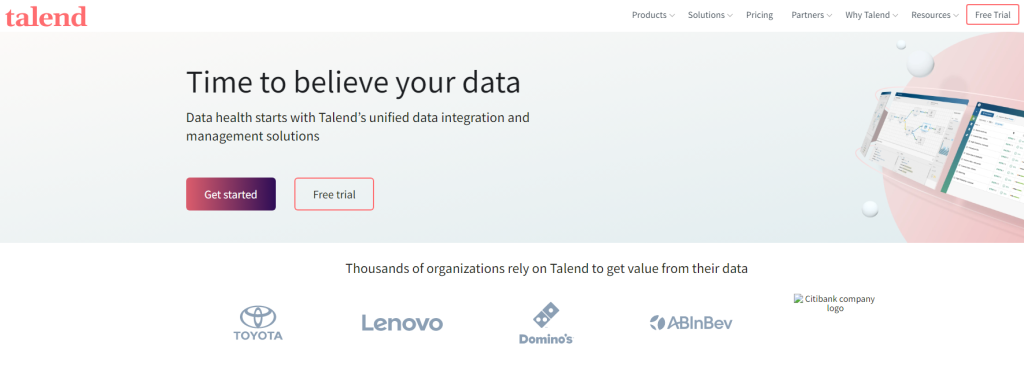
Talend offers several different products for performing ETL tasks. It has an open-source Talend Data Studio as well as paid ETL services – Talend Data Fabric. The Talend Data Fabric includes the Talend Studio, Stitch, Talend Big Data, Management Console, API Services, Data Inventory, Pipeline Designer, Data Preparation, and Data Stewardship.
Talend solutions support over 1000 connectors and offer Talend Component Kit to add custom connectors. There are pre-built integration templates and a wide variety of components to ease data-related processes.
Pros
• Over a thousand supported connectors
• Open-source tool available
• Browser-based, graphical pipeline designer
• Extendable using Python
Cons
• Talend Data Fabric is pricey
• Pricing isn’t publicly available; you need to contact the sales
Pricing
Talend pricing isn’t publicly available. You need to contact sales to discuss pricing. However, Talend offers a free trial. Besides, you can use their open-source Talend Data Studio for free.
Fivetran
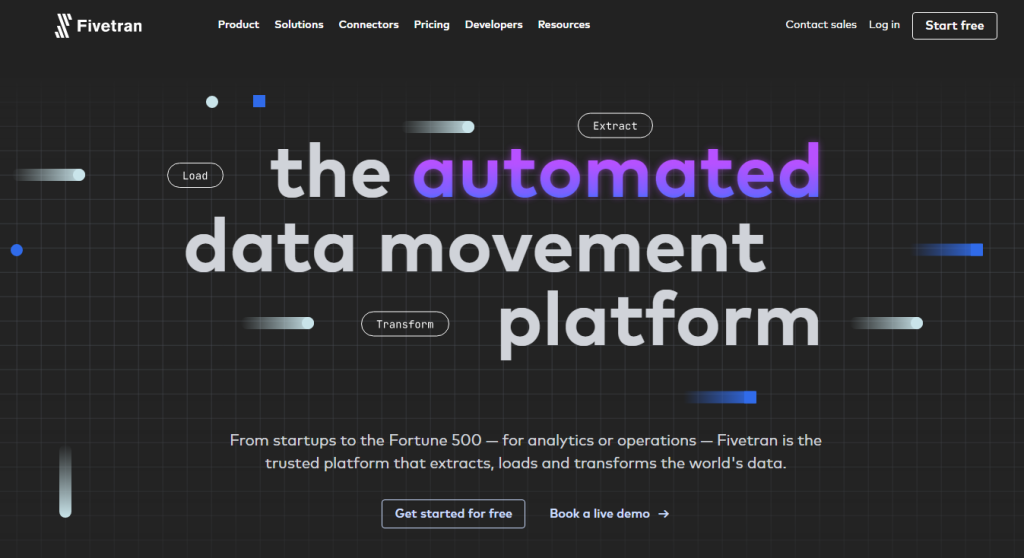
Fivetran is an automated data movement platform for moving data between different sources using API interfaces allowing business users to create and deploy data-driven reports and dashboards based on data from their primary data sources.
Pros
• 300+ connectors supported
• Custom connectors feature available
• Five minutes or less sync frequencies
• Streaming data loading support
• Easy-to-use quickstart transformations
• Allows post-load data transformation via SQL
Cons
• No data loading to cloud apps
• No sync schedule by a fixed time
• No data transformations before sending data to the warehouse; they are only applied afterward
Pricing
Fivetran pricing is mostly volume-based and feature-based. There are several pricing tiers with different features available, and for each tier, the monthly quote depends on the number of records actually loaded per month. The more records you load, the less your cost per row for the next rows. A trial period is available for several pricing plans.
Stitch
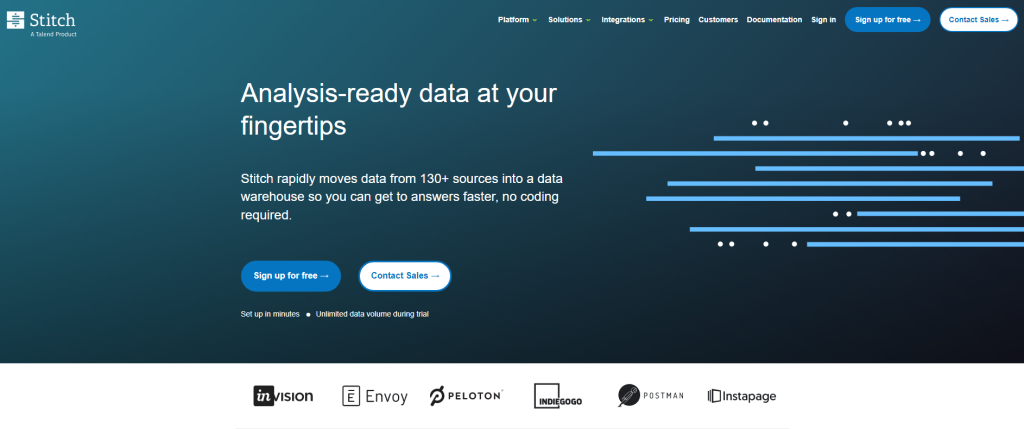
Stitch is a popular ETL tool to help you load data from various cloud apps and databases to cloud data warehouses and databases. It was acquired by Talend in 2018. After that, it continues to operate as an independent unit. It supports over 130 connectors to cloud apps, databases, and file storages.
Pros
• No-coding integration configuration
• Extensible via REST API
• Enterprise-grade security and data compliance
• Integration with Singer open-source framework
Cons
• No free pricing plan
• Limited transformation features
• Supports ETL in BigQuery, but not from BigQuery
Pricing
Some time ago, Stitch used to have a free pricing plan with up to 5 million records per month, but it’s no longer the case. Currently, Stitch pricing plans start at $100 per month for 5 million records. The number of records per month can be customized. The higher tier pricing plans offer more features and higher amounts of rows. Stitch also offers a free trial period.
Apache Spark
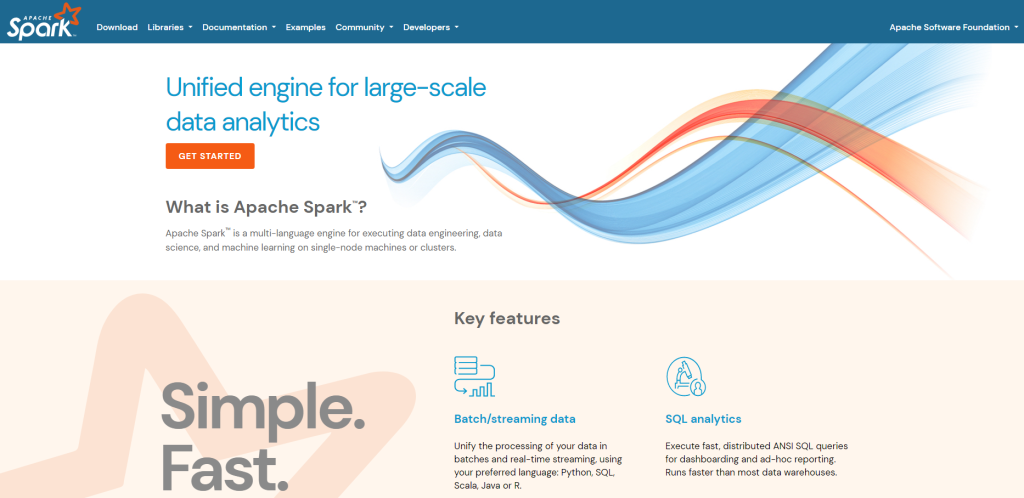
Apache Spark is an open-source data transformation engine. It allows batch streaming data, data analysis with ANSI SQL queries, performing Exploratory Data Analysis (EDA) with huge data volumes, machine learning, etc. It supports different file formats and databases via JDBC and has a number of third-party connectors, including connectors to Google BigQuery, Snowflake, etc.
Pros
• Free and open-source solution
• Works with structured and unstructured data
• Supports different programming languages
Cons
• Requires coding knowledge
• No dedicated technical support
Pricing
• Free of charge
Conclusion
In today’s fast-paced business environment, companies are faced with an overwhelming amount of data that needs to be harnessed effectively in order to gain a competitive edge. ETL tools play a crucial role in solving this challenge by automating and simplifying data integration tasks, reducing manual intervention, and ensuring data quality and consistency. In this article, we delve into the world of ETL tools designed to enhance your experience with Google BigQuery, a popular and powerful analytics platform.
Among various noteworthy BigQuery ETL tools, Skyvia stands out as a superior choice, owing to its advanced features, user-friendly interface, and generous free plan for beginners to explore. By leveraging its robust data integration solutions, you can optimize your data management workflows and fully harness the power of Google BigQuery, ultimately driving impactful outcomes for your company. Start free and try out all Skyvia features!
